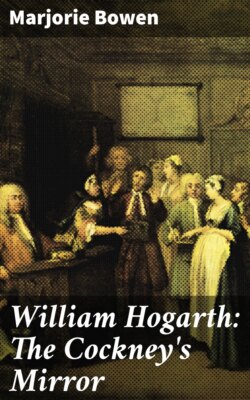Читать книгу William Hogarth: The Cockney's Mirror - Bowen Marjorie - Страница 9
На сайте Литреса книга снята с продажи.
* * *
ОглавлениеTable of Contents
The dress of both sexes was highly fantastic; the era of commonsense, of democracy, had not dawned; the cavalier costume that had triumphed at the Restoration had evolved into very elaborate, costly fashions, which included the use of expensive materials, broadcloth, velvet, satin brocade, fine linen, and such adornments as elaborate hand-embroidery, buttons, buckles and clasps of precious metals and stones. Many of these were foreign, taxed, and smuggled. The main characteristics of the period were, however, the powdered hair or wig, and the hoop or farthingale. During the period of which we treat these had not become so ugly and grotesque as they did during the last quarter of the century; indeed, the dress of the upper classes was rich and becoming, the male fashions being in particular attractive, elegant and graceful.
As all these clothes were hand-cut, hand-made and hand-embroidered, lace and embroidery being the result of patient stitching, and ornaments the result of skilled individual craftsmanship, the complete costume had great beauty and distinction; even when old and damaged, the hand-woven, hand-dyed stuff was pleasing in its faded shades. No one was, in the modern sense, cheaply dressed, since it was impossible to obtain the 'imitation,' 'slop' article; even the humblest garment was the result of someone's personal labour, since mass production was unknown.
The lower classes dressed in a modification of the Puritan style, plain, warm, sensible garments, with short, unpowdered hair; this sharp difference in attire helped to distinguish most clearly one class from another; clergy, lawyers, doctors had their peculiar, unmistakable garb, while officers of both services wore their elaborate uniforms on all occasions.
The manner in which the people lived was on the same lines as their clothes, rich and fantastic, elegant and graceful, where there was money, useful and plain where there was little, squalid where there was none.
